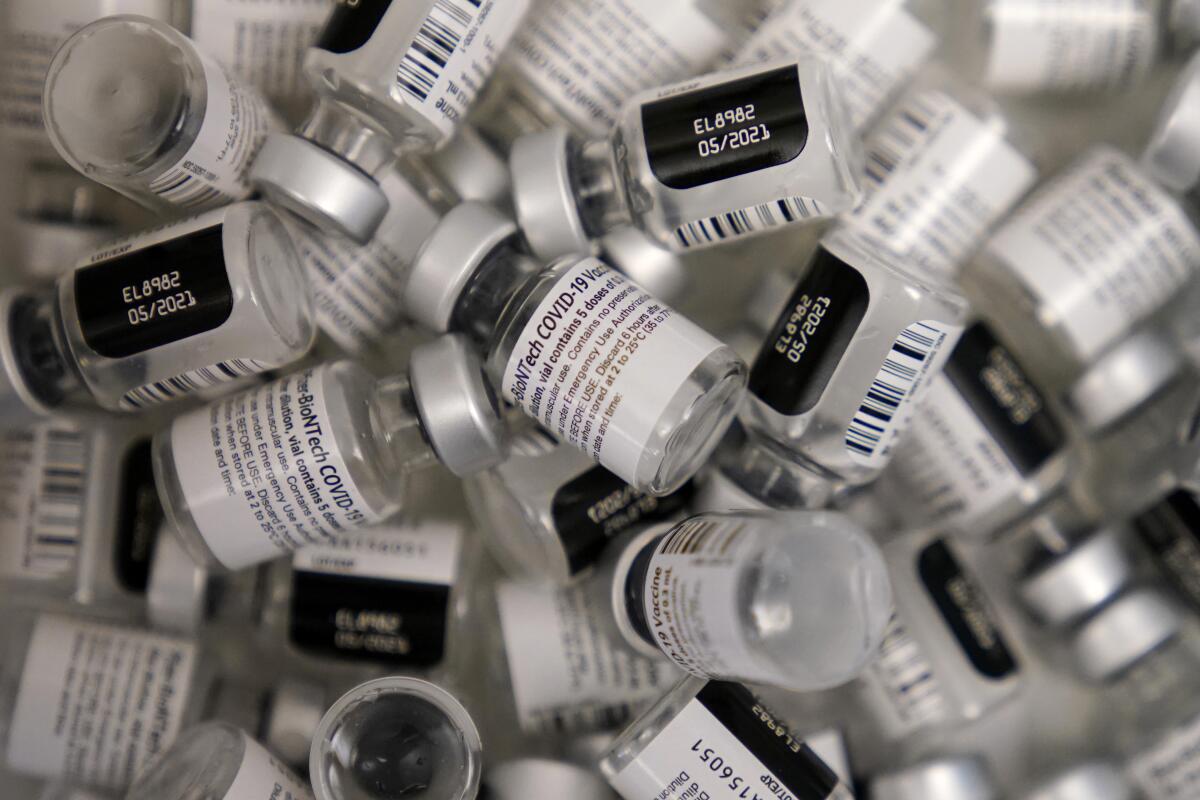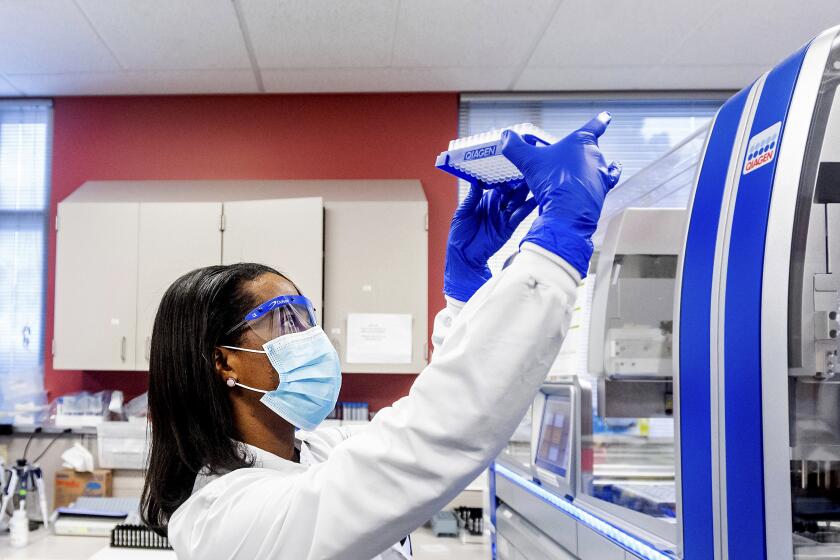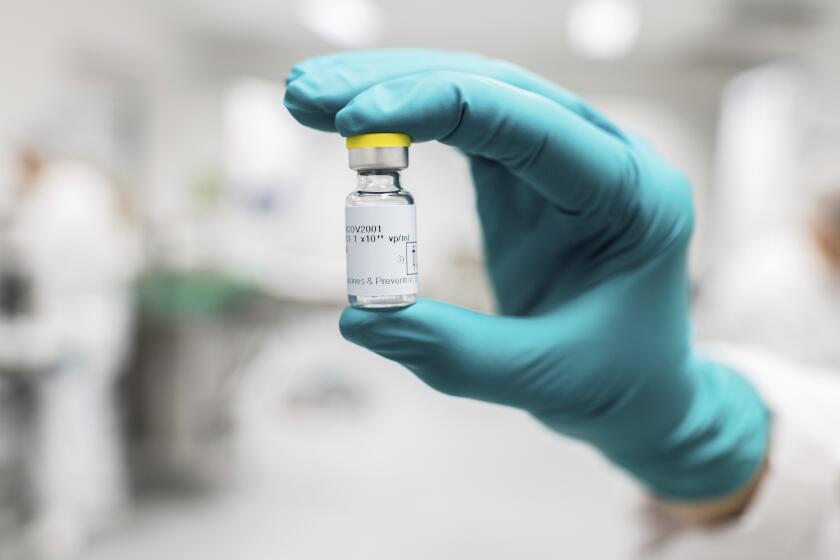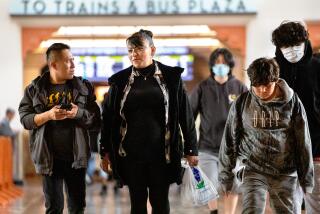Scientists explore ways to tweak COVID-19 shots if coronavirus variants get worse

- Share via
The makers of COVID-19 vaccines are figuring out how to tweak their recipes against worrisome virus mutations — and regulators are looking to flu as a blueprint if and when the shots need an update.
“It’s not really something you can sort of flip a switch, do overnight,” cautioned Richard Webby, who directs a World Health Organization flu center from St. Jude Children’s Research Hospital.
Viruses mutate constantly, and it takes just the right combination of particular mutations to escape vaccination. But studies are raising concern that first-generation COVID-19 vaccines don’t work as well against a variant that first emerged in South Africa as they do against other versions circulating around the world.
The good news: Many of the new COVID-19 vaccines are made with new, flexible technology that’s easy to upgrade. What’s harder: deciding whether the virus has mutated enough that it’s time to modify vaccines — and what changes to make.
“When do you pull the trigger?” asked Norman Baylor, a former Food and Drug Administration vaccine chief. “This is a moving target right now.”
The WHO and FDA are looking to the global flu vaccine system as they decide how to handle similar decisions about COVID-19 shots.
Influenza mutates much faster than the coronavirus, and flu shots have to be adjusted just about every year. National centers around the globe collect circulating flu viruses and track how they’re evolving. They send samples to WHO-designated labs for more sophisticated “antigenic” testing to determine vaccine strength. The WHO and regulators then agree on the year’s vaccine recipe and manufacturers get to work.
For COVID-19 vaccines, Webby said a critical step is establishing a similar surveillance and testing network to flag the mutations that matter. Today, there’s wide geographic variability in tracking and testing mutated versions. For example, Britain does more testing of the changing viral genome than the U.S.
The Biden administration is boosting efforts to identify and track coronavirus variants to help scientists see where the pandemic is heading next.
Three variants first discovered in Britain, South Africa and Brazil are worrisome because they have combinations of mutations that make them more contagious.
On Sunday, U.S. researchers reported a still different mutation found in seven variants that have cropped up in several states. No one yet knows if this mutation makes the virus easier to spread but the report, not yet vetted by other scientists, urges further research to find out.
Just because a variant is more contagious doesn’t mean it also will be impervious to vaccination. But the variant first identified in South Africa is raising concerns. Dr. David Ho, an immunology researcher at Columbia University, put blood samples from people given the Pfizer-BioNTech or Moderna vaccines into lab dishes with the mutated virus. Vaccine-produced antibodies still protected, but they were much less potent.
Preliminary test results of two other vaccine candidates — from Novavax and Johnson & Johnson — soon backed up those findings. Both were protective, but they were weaker when tested in South Africa than when tested elsewhere. A far smaller test of the AstraZeneca vaccine in South Africa has raised questions about its effect.
“If the virus were able to make an additional mutation or two, it could escape even more,” Ho warned.
COVID-19 vaccines may be less effective against the coronavirus strain from South Africa, but scientists remain confident that humans have the upper hand.
If fully immunized people start getting hospitalized with a mutated virus, “that’s when the line gets crossed,” said Dr. Paul Offit, a Children’s Hospital of Philadelphia vaccine expert who advises the FDA.
That hasn’t happened yet, but “we should get ready,” he added.
Moderna is about to explore one option: Could a third dose of the original vaccine boost immunity enough to fend off some variants even if it’s not an exact match?
Ho said it’s a good idea to test because people may “still have plenty of cushion” if their overall antibody levels are very high.
Major manufacturers also are developing experimental variant vaccines, just in case.
COVID-19 vaccines produce antibodies that recognize the spike protein that coats the coronavirus. When the virus mutates, sometimes the spike protein is changed in key areas, so the vaccine-produced antibodies have a harder time recognizing it.
The Pfizer and Moderna vaccines are made with a piece of genetic code called messenger RNA that tells the body how to make some harmless copies of the spike protein that train immune cells. To update the vaccine, they can simply change the payload: swap out the original genetic code with mRNA for the mutated spike protein.
The AstraZeneca vaccine and the Johnson & Johnson shot expected to roll out soon are made with cold viruses engineered to sneak a spike protein gene into the body. Adjusting their vaccines requires growing cold viruses with the mutated gene, a little more complex than the mRNA approach but not nearly as laborious as reformulating old-fashioned flu shots.
The Novavax vaccine also in final-stage testing is made with a lab-grown copy of the spike protein that also could be tweaked to match mutations.
The J&J vaccine didn’t appear to perform as well as others in clinical trials. But scientists say it is impossible to know whether any one vaccine is better.
First-generation COVID-19 vaccines were tested in tens of thousands of people to be sure they work and are safe — research that took many months.
Simply changing the recipe to better target virus mutations won’t require repeating those studies in thousands of people, Dr. Peter Marks, the FDA’s vaccine chief, recently told the American Medical Assn.
The FDA still is finalizing requirements, but Marks said the agency intends to “be pretty nimble.” If an updated vaccine is needed, tests in a few hundred people likely would be enough to tell if it triggers a good immune response, he said.
But an even bigger question: If only some places face vaccine-resistant virus variants, would authorities want variant-only shots or vaccines that protect against two kinds in one jab? After all, flu vaccines protect against three or four different types in one shot.
Companies would first have to perform some basic research to be sure a variant-only version properly revs up the immune system, said John Grabenstein, a former Merck vaccine executive now with the Immunization Action Coalition. Then a combination shot would need more testing to be sure there’s an equal response to both types.









